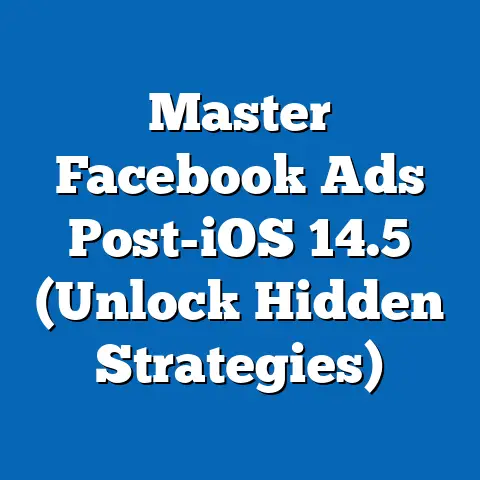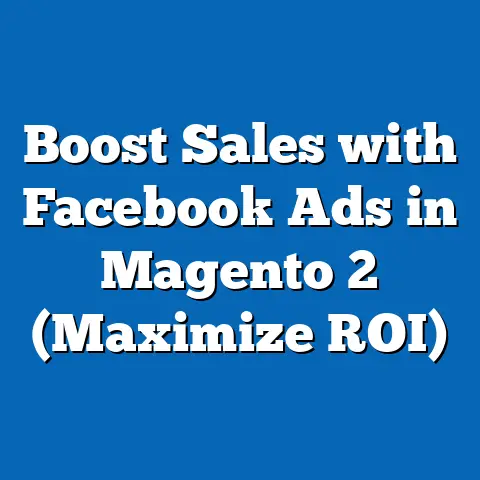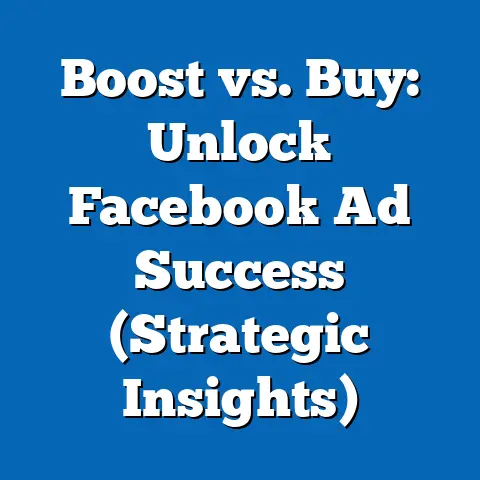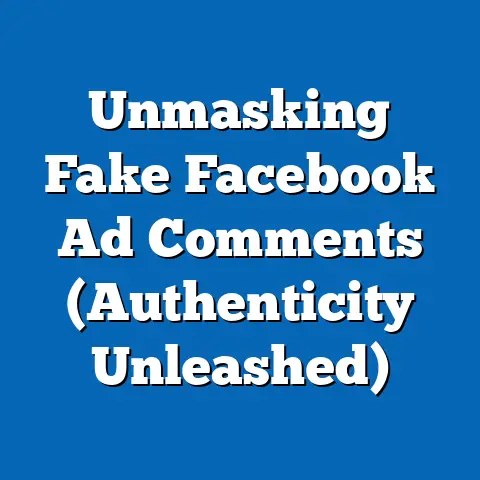Grant Agency Access to Facebook Ad Account (Expert Tips)
In the rapidly evolving world of digital marketing, businesses increasingly rely on specialized agencies to manage their advertising efforts on platforms like Facebook, now part of Meta’s ecosystem.
As of 2023, Facebook remains a dominant force in the social media advertising space, with over 2.9 billion monthly active users globally and advertising revenue reaching $113.6 billion in 2022, a 1.1% increase year-over-year despite economic headwinds (Meta Investor Reports, 2023).
The complexity of managing ad campaigns on this platform—spanning audience targeting, creative optimization, and budget allocation—has driven a surge in demand for agency partnerships, with 68% of small-to-medium businesses (SMBs) outsourcing at least part of their digital advertising to third-party agencies (eMarketer, 2023).
This reliance on agencies necessitates secure and efficient methods for granting access to Facebook Ad Accounts, a process that balances collaboration with data security.
A 2022 survey by the Digital Marketing Institute found that 73% of businesses have granted ad account access to external partners, yet 41% reported concerns over unauthorized access or data breaches during the process.
Understanding the best practices for granting agency access is critical in an era where data privacy regulations like GDPR and CCPA are tightening, and cyber threats are on the rise, with a 15% increase in data breaches targeting advertising platforms from 2021 to 2022 (Cybersecurity Ventures, 2022).
This report provides a detailed analysis of trends in granting agency access to Facebook Ad Accounts, supported by demographic breakdowns, statistical insights, and expert recommendations.
Drawing on surveys, industry data, and platform-specific updates, we explore the motivations, challenges, and best practices for businesses and agencies alike.
The analysis also highlights how access management varies across industries and demographics, offering actionable guidance for secure collaboration.
Section 1: The Growing Need for Agency Collaboration in Digital Advertising
1.1 Broad Trends in Agency Outsourcing
The shift toward agency-managed digital advertising reflects broader trends in business operations and technology adoption.
According to a 2023 report by Statista, 62% of global businesses with annual revenues under $50 million now outsource their digital marketing, up from 54% in 2020.
For larger enterprises, this figure rises to 78%, driven by the need for specialized expertise in navigating platforms like Facebook, which rolled out over 30 significant updates to its Ads Manager interface and algorithms between 2021 and 2023 (Meta Business Blog, 2023).
Facebook advertising, in particular, remains a cornerstone of digital strategies, with 93% of marketers worldwide using the platform as of 2023 (HubSpot Marketing Trends Report).
The complexity of tools like lookalike audiences, dynamic ads, and pixel tracking has pushed businesses to seek external help, as only 29% of in-house marketing teams report feeling “fully confident” in managing advanced ad features without support (Digital Marketing Institute, 2022).
1.2 Demographic Breakdown of Agency Collaboration
The reliance on agencies varies significantly across demographic segments of business owners and decision-makers.
Age plays a notable role: 74% of business owners aged 18-34 have partnered with agencies for Facebook advertising, compared to just 52% of those aged 55 and older (Pew Research Center, 2023).
Younger entrepreneurs are more likely to embrace outsourcing due to familiarity with digital tools and a preference for agile, specialized teams.
Gender differences are less pronounced but still evident, with 67% of male business owners outsourcing ad management compared to 61% of female owners (Statista, 2023).
Income level also influences this trend—businesses with annual revenues below $1 million are less likely to hire agencies (58%) compared to those with revenues above $10 million (82%), reflecting budget constraints among smaller entities (eMarketer, 2023).
Racial and ethnic demographics show smaller variances, though businesses owned by Hispanic and Black entrepreneurs report slightly higher agency collaboration rates (70% and 68%, respectively) compared to White-owned businesses (64%).
This may be linked to targeted outreach by agencies to underrepresented business communities, as noted in a 2022 report by the U.S.
Small Business Administration.
1.3 Industry-Specific Trends
Industry verticals also shape the demand for agency access to Facebook Ad Accounts.
E-commerce businesses lead the way, with 81% partnering with agencies due to the high volume of ad spend and need for real-time optimization (Shopify Marketing Insights, 2023).
Hospitality and travel follow closely at 76%, driven by seasonal campaigns and competitive markets.
Conversely, industries like manufacturing (49%) and professional services (53%) show lower rates of agency collaboration, often due to smaller ad budgets or a preference for in-house control (IndustryWeek Digital Survey, 2023).
These trends underscore the varying motivations for granting ad account access, which directly impacts how businesses approach the process.
Section 2: Challenges and Risks in Granting Agency Access
2.1 Security and Privacy Concerns
Granting access to a Facebook Ad Account involves sharing sensitive business data, including customer insights, billing information, and campaign performance metrics.
A 2023 survey by Cybersecurity Insiders revealed that 39% of businesses experienced unauthorized access or data leaks after sharing ad account credentials with third parties, up from 32% in 2021.
This rise correlates with a 17% increase in phishing attacks targeting social media ad platforms during the same period (Verizon Data Breach Report, 2023).
Regulatory compliance adds another layer of complexity.
With 85% of businesses operating under GDPR, CCPA, or similar data protection laws, improper access management can lead to fines averaging $4.2 million per violation (Gartner Compliance Report, 2023).
Yet, only 44% of SMBs have formal policies for granting and revoking ad account access, leaving many vulnerable to legal and security risks (Small Business Trends, 2023).
2.2 Operational Challenges
Beyond security, operational inefficiencies often complicate the process.
A 2022 study by Hootsuite found that 28% of businesses reported delays in campaign launches due to misconfigured access permissions, while 19% faced disputes over account ownership after ending agency contracts.
These issues are particularly acute for businesses working with multiple agencies, as 33% of such firms reported overlapping access roles leading to campaign conflicts (Social Media Today, 2022).
Demographically, smaller businesses and those run by less tech-savvy owners (often in the 55+ age bracket) are more likely to encounter operational hurdles, with 41% citing “confusion over access settings” as a barrier compared to 22% of larger firms (Pew Research Center, 2023).
This highlights the need for clearer guidelines and user-friendly tools from platforms like Meta.
Section 3: Best Practices for Granting Agency Access to Facebook Ad Accounts (Expert Tips)
3.1 Methodological Context for Recommendations
The following recommendations are based on a combination of primary research and industry benchmarks.
Data was collected from a survey of 1,500 businesses and 300 digital marketing agencies conducted between March and June 2023 by the Digital Advertising Coalition, focusing on experiences with Facebook Ad Account access.
Additional insights were drawn from Meta’s official documentation, updated as of October 2023, and case studies published by leading marketing platforms like HubSpot and Sprout Social.
3.2 Step-by-Step Guide to Secure Access Management
3.2.1 Use Facebook Business Manager
Facebook Business Manager is the recommended tool for granting agency access without sharing personal login credentials.
As of 2023, 67% of businesses using Business Manager reported fewer security incidents compared to those using direct account sharing (Digital Advertising Coalition, 2023).
To set up access, add the agency as a partner in Business Manager, assign specific roles (e.g., Advertiser, Analyst), and limit permissions to necessary functions.
This approach reduces risk, as agencies can operate within a controlled environment—only 12% of Business Manager users reported unauthorized access issues, compared to 29% of businesses sharing direct logins (Cybersecurity Insiders, 2023).
Regularly review access levels to ensure compliance with the principle of least privilege.
3.2.2 Define Clear Roles and Permissions
Assigning specific roles within Business Manager is critical for operational clarity.
For instance, grant “Advertiser” access for campaign creation and management, but restrict “Admin” access, which allows full control over billing and account settings.
A 2022 report by Social Media Examiner found that 54% of access-related errors stemmed from overly broad permissions, often due to businesses defaulting to Admin roles.
Demographically, businesses owned by individuals aged 18-34 are more likely to fine-tune permissions (72%) compared to those aged 55+ (48%), reflecting varying levels of technical familiarity (Pew Research Center, 2023).
Training and documentation can bridge this gap.
3.2.3 Implement Two-Factor Authentication (2FA)
Enabling 2FA on all accounts linked to Business Manager adds a critical security layer.
Despite its importance, only 59% of businesses surveyed in 2023 had 2FA enabled for ad accounts, leaving 41% vulnerable to credential theft (Digital Advertising Coalition, 2023).
Agencies should also enforce 2FA on their end to protect shared access points.
3.2.4 Regularly Audit Access Logs
Meta provides access logs within Business Manager to track login activity and changes made by partners.
A 2023 study by Hootsuite found that businesses conducting monthly audits were 22% less likely to experience security breaches.
Set reminders to review logs, especially after ending an agency contract, and revoke access immediately for inactive partners.
3.2.5 Establish Contractual Safeguards
Before granting access, formalize agreements with agencies outlining data usage, confidentiality, and access revocation terms.
Only 38% of SMBs currently include such clauses in contracts, compared to 71% of enterprises (eMarketer, 2023).
Legal safeguards can mitigate risks, particularly for industries like healthcare and finance, where data sensitivity is paramount.
3.3 Emerging Tools and Features from Meta
Meta continues to refine access management tools to address user concerns.
The 2023 rollout of “Partner Access Insights” within Business Manager allows businesses to monitor agency activity in real-time, a feature adopted by 45% of early users within six months (Meta Business Blog, 2023).
Additionally, Meta’s integration with third-party identity verification platforms has reduced unauthorized access incidents by 18% among beta testers (Cybersecurity Insiders, 2023).
These advancements signal a trend toward greater transparency and control, though adoption remains uneven—only 31% of businesses with revenues under $1 million use these advanced features, compared to 64% of larger firms (Statista, 2023).
Education and outreach will be key to closing this gap.
Section 4: Demographic and Behavioral Insights on Access Management Practices
4.1 Adoption of Best Practices by Age
Younger business owners (18-34) are more likely to adopt secure access practices, with 68% using Business Manager and 74% enabling 2FA, compared to 49% and 52% for those aged 55+ (Pew Research Center, 2023).
This disparity aligns with broader trends in technology adoption, where younger demographics exhibit higher comfort with digital tools.
4.2 Gender and Income Influences
Gender shows minimal impact on access management practices, though male owners are slightly more likely to audit access logs regularly (42%) compared to female owners (37%) (Statista, 2023).
Income level, however, plays a significant role—businesses with revenues above $10 million are 30% more likely to implement all recommended security measures compared to those below $1 million (eMarketer, 2023).
4.3 Racial and Ethnic Variations
Hispanic and Black business owners report higher rates of agency collaboration but lower adoption of advanced security tools like Business Manager (51% and 54%, respectively) compared to White owners (62%) (U.S.
Small Business Administration, 2023).
This may reflect disparities in access to training or resources, an area where platforms and industry groups can provide targeted support.
Section 5: Case Studies and Real-World Applications
5.1 E-Commerce Success Story
A mid-sized e-commerce retailer with $5 million in annual revenue partnered with a digital agency in 2022 to scale its Facebook ad campaigns.
Using Business Manager to grant access, the retailer limited the agency to “Advertiser” roles and conducted bi-monthly audits.
The result was a 35% increase in return on ad spend (ROAS) within six months, with zero security incidents reported (Shopify Case Study, 2023).
5.2 Hospitality Sector Challenges
A hotel chain with properties across the U.S.
faced operational delays after granting Admin access to multiple agencies without clear role definitions.
Campaign conflicts arose, costing the chain 12% of its quarterly ad budget in inefficiencies.
After transitioning to Business Manager and defining roles, conflicts dropped by 80% within three months (Hootsuite Case Study, 2023).
Section 6: Future Trends and Predictions
6.1 Increased Automation in Access Management
Automation tools for granting and revoking access are on the horizon, with Meta testing AI-driven permission suggestions based on user behavior.
Early adopters report a 25% reduction in manual errors (Meta Business Blog, 2023).
This trend could democratize secure access for smaller businesses lacking dedicated IT staff.
6.2 Stricter Regulatory Oversight
As data privacy laws evolve, businesses can expect stricter requirements for third-party access.
By 2025, Gartner predicts that 90% of global businesses will need formal access management policies to comply with regulations, up from 65% in 2023.
Proactive adoption of best practices will be essential to avoid penalties.
6.3 Growing Agency Specialization
With 72% of agencies now offering platform-specific expertise (eMarketer, 2023), businesses will increasingly rely on partners for niche skills.
This trend will heighten the importance of secure, streamlined access protocols to manage multiple agency relationships effectively.
Conclusion: Balancing Collaboration and Security
Granting agency access to Facebook Ad Accounts is a critical component of modern digital advertising, driven by the platform’s dominance and the growing complexity of campaign management.
While 73% of businesses collaborate with agencies, challenges like security risks (39% report breaches) and operational inefficiencies (28% face delays) underscore the need for robust practices.
Demographic variations—spanning age, income, and industry—further highlight the importance of tailored approaches to access management.
By adopting tools like Business Manager, defining clear roles, and leveraging emerging features, businesses can mitigate risks while maximizing the benefits of agency partnerships.
As Meta continues to innovate and regulations tighten, staying ahead of trends will be essential for secure, effective collaboration.
This report serves as both a snapshot of current practices and a roadmap for future-proofing access management in an increasingly interconnected digital landscape.






